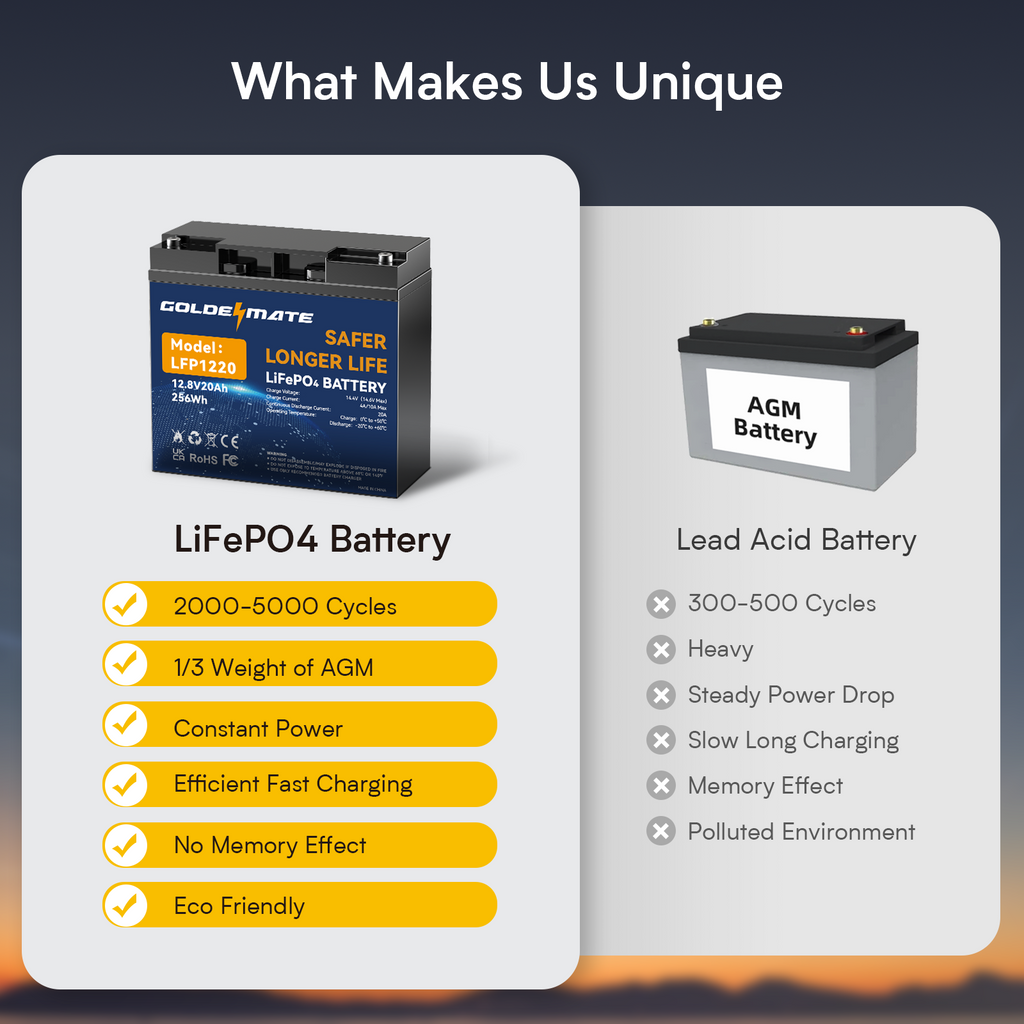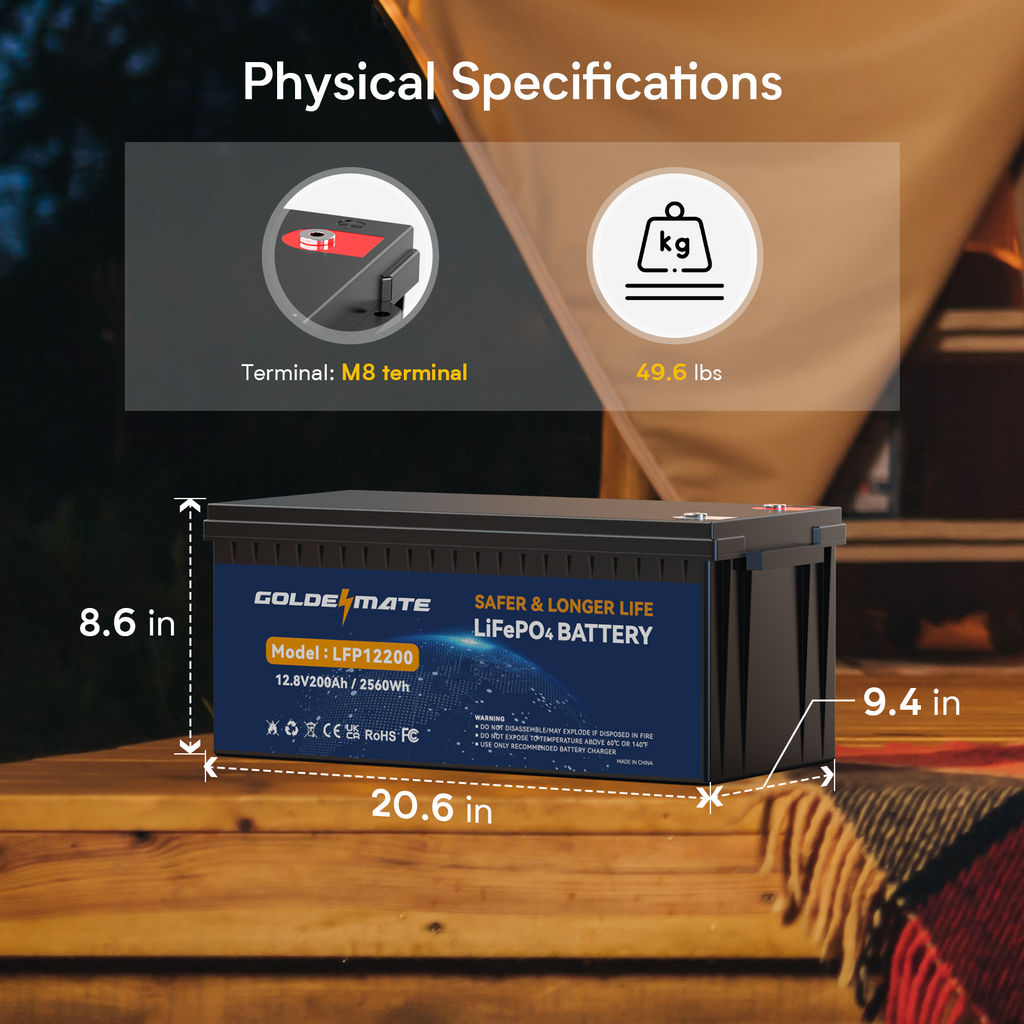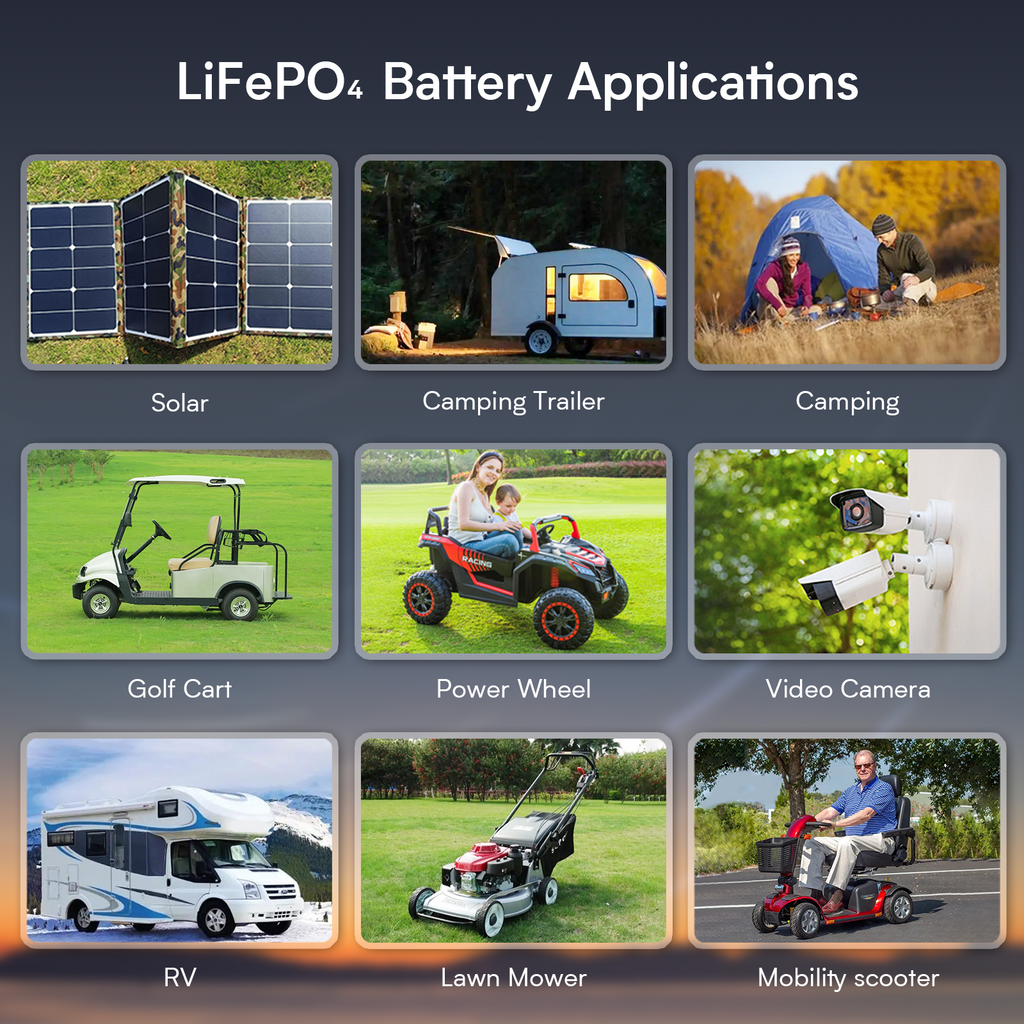Store electricity has become a recent subject among us humans. There are many ways, and you can be overwhelmed by the many options. From battery for your caravan, motorhome, home solar system, or even your boat. When facing this type of decision, reaching a proper decision is sometimes difficult.
This blog post will help you understand the battery of the future. We will discuss the benefits of Lithium Iron Phosphate Batteries and will provide you with the necessary information that this is the safest lithium battery for your electronic appliances.
Buy the LiFePO4 Lithium Battery
What is LiFePO4 battery?
Lithium Iron Phosphate Battery or also known as LiFePO4 or LFP is a rechargeable lithium-ion battery. You may believe that it is the same as any other lithium battery, but this is not necessarily true.
Lithium-ion batteries have increased their popularity since they can power small electrical devices such as laptops or cell phones. But you also may recall that these batteries have a reputation for thermal events.
This is where LFP batteries step in. These batteries have a cathode material made from lithium iron phosphate. This type of lithium is inherently non-combustible while allowing slightly lower energy density.
What are the main differences with other batteries?
LiFePO4 vs. Lead Acid Batteries
The main difference when looking for a battery is sometimes the price range. Lead-acid batteries are much cheaper initially. However, you will end up paying more in the end. This is because of the maintenance and frequent replacement of Lead Acid Batteries you will have to make.

Buy the LiFePO4 Lithium Battery
LiFePO4 vs. Gel Batteries
This type of battery is similar to LiFePO4 in the way they do not need to be recharged as frequently. However, they take more time when recharging. When they reach 100%, you need to immediately disconnect them to avoid damaging them.
LiFePO4 vs. AGM Batteries
Not only is the maintenance of high cost, but also there is a high risk of damaging them when they are drained over 50% of their capacity.
LiFePO4 vs. Lithium-ion Batteries
As we already mentioned, there is a wealth of applications with lithium batteries. This is from watches, electronic vehicles, electric tools, and medical equipment.
If we compare these two types of batteries, ion vs. iron, we can observe that LiFePO4 has a lower energy density. This means that it is unsuitable for small electronic devices, but it does get the job properly done.
They sometimes need clarification since both are rechargeable. However, in regard to their life cycle, LiFePO4 has a longer life cycle.
Top 7 Benefits of LiFePO4 Batteries
Buy the 12V 100Ah LiFePO4 Lithium Battery
These types of batteries have many advantages over the rest, which as a result, is making them more popular. Here we will break down the main reasons:
1. Efficiency and charging process
This is a significant factor, and compared to other batteries, lithium iron batteries offer improved discharge and charge efficiency. Their life span is longer, and they also have the ability to deep cycle while maintaining performance.
In regards to battery life, the self-discharge is a mere 2%, compared to lead-acid, which is 30%. If the battery life is lower than 50%, the power will still be consistent. Additionally, if we think about the charging time, they reach full charge in just two hours and sometimes even less.

They come with a higher price tag, but the life of the product is much better. Their service clocks in at five to ten years, significantly exceeding lead-acid and any other lithium batteries.
So if you are looking for a battery that stands the test of time plus has excellent charging efficiency, LiFePO4 is the one.
2. Lightweight

LFP does deliver 50% more usable electrical capacity making it up to 70% lighter than lead-acid batteries. Plus, they can also be lighter than some lithium-ion batteries.
They also come in smaller battery packs, providing more space.
If also compared to lead acid batteries, these require battery boxes and wiring for their installations. LiFePO4 batteries don´t.
3. Environmentally more friendly

The highlight of these batteries is that they are rechargeable. Moreover, they don´t leak, they are non-toxic, and they are recyclable. These batteries don´t contain heavy or rare earth metals such as cobalt, nickel, or lead. They are composed of materials such as graphite, iron, and copper.
Lead acid and nickel oxide batteries carry a significant environmental risk. As their internal chemical degrades structure after some time, and this causes poisonous leakage.
Another environmental benefit of their LiFePO4 batteries is that the packs are easy to recycle at the end of their working life.
4. Stable Chemistry
LFP batteries are built with phosphate, which offers superior thermal and chemical stability and the safest lithium chemistry.
To make it easier to understand, phosphate cells are incombustible. This is relevant since the LFP batteries won´t explode or catch fire even in the event of a short circuit or a crash.
5. Temperature range
LiFePO4 batteries operate efficiently in a wide range of temperatures.
It is a well-known fact that lithium-ion batteries are greatly affected by temperature. Their temperature range is between 32° F (0° C) and 113° F (60° C). If the temperature is outside this range, the performance of the battery will degrade significantly.
LiFePO4 batteries can function well in temperatures that go as low as -4° F (-20° C) and as high as 140° F (60° C). Making it a battery that can operate efficiently all year round.
6. Long life cycle
Before getting into specifics, you need to understand that a cycle in a battery occurs each time you discharge and recharge it.
LFP can charge and discharge between 2,500 and 5,000 cycles before losing 20% of their original capacity. As a result, their longevity is between 7 to 10 years.
A regular or typical lead-acid battery can provide an estimated 300 cycles before a decline in capacity efficiency. Making these more frequent replacements, wasting time and money, and, again, not eco-friendly.
Youn can also click here and here for more information in regards to it´s lifespam.
7. Solar Power System
If you are a person that needs portable power stations, LiFePO4 batteries are ideal since they allow for solar charging.
These batteries can supply an entire off-grid home or RV if it is attached to an adequate solar panel.
What are the uses of a LiFePO4 battery?
We have gone through all the benefits and technical information about these batteries. But where you can make use of this battery is also vast.
- Camping
- Trailer
- Lawn Mower
- Rv
- Mobility Scooter
- Golf Cart
- Video Camera
- Boats

If you need more information in regards you RV or motorhome you can read more here.
Final Thoughts
Batteries have become part of our everyday lives. We have also become more conscious of the human in environmental costs. From our smartphones and laptops to our current electric vehicles and much more. They power our electric grids since wind and solar power are not that powerful.
However, LiFePO4 batteries are the first step in the right direction. They are the batteries of the future. They won´t leak, won´t emit explosive gasses, and during a crash, they won´t start a fire.
Goldenmate energy has implemented LiFePO4 batteries because of all these advantages and the remarkable results.




Share:
How Long Do LiFePO4 Batteries Last?
LiFePO4 Batteries vs. Lithium-ion Batteries, Which Is Best?